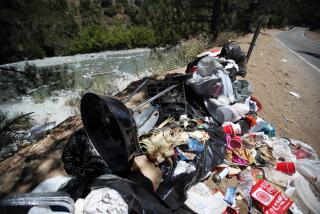Is the Cure for Our Ills Charity Instead of Welfare? : Politics: Huffington claims that government cheats people out of the spiritual rewards of giving to the needy.
Political patronage has assumed many disguises since Jean-Jacques Rousseau wrote about the princess who proposed for breadless peasants, “Let them eat cake.” Efforts to aid the poor--more sizzle than substance during the Reagan and Bush eras--acquired a certain cachet as volunteerism and are now a California campaign issue.
Facing Democratic Sen. Dianne Feinstein, Rep. Mike Huffington has recast volunteerism as the answer to the welfare state. He’s spending millions on TV ads to sell the thesis: End government’s role as a welfare provider and let private philanthropy assume the total burden for charity.
The Republican congressman from Santa Barbara lacks a serious record as an anti-welfare crusader, but, no problem. His author-wife, Arianna, has repackaged volunteerism in a recent book as a New Age mega-virtue. Government, goes her mantra, cheats people out of the spiritual rewards of giving to the needy.
One Huffington TV spot shows efforts by conservative eggheads trying to prove how ideals like virtue, community and empowerment can end welfare. It ignores how homelessness, which has increased in Los Angeles about 15% each year for the past decade, challenges the notion that people left to their own devices won’t exactly stampede to pick up the check.
Author Tom Wolfe, describing 1960s radical chic, freeze-framed the volunteerism of the day by dissecting the motives of parvenu New Yorkers “paying dues ‘to the poor,’ via charity, as a way of claiming the nobility inherent in noblesse oblige.” East Side soirees found Black Panthers mingling with patronizing social and cultural elites. One party became an epochal event not because the host was fashionable but because his guests, Cesar Chavez’s farm-union workers, were.
Philanthropic chic, Huffington’s post-radical-chic embrace of noblesse oblige, is already falling apart. One of George Bush’s ill-fated “thousand points of light”--a nighttime youth basketball program envisioned as a volunteer effort without cost to taxpayers, is now enshrined, with Huffington’s vote, as a bipartisan example of social spending in President Clinton’s anti-crime bill.
Even on the corporate level, philanthropic chic has faltered. As charitable requests of businesses mount, the level of giving is threatened by the bottom line, mergers and downsizing. The stunning decision by Arco, a national pacesetter in corporate philanthropy, to virtually eliminate its Los Angeles-based foundation, suggests volunteerism has limits.
Consider the Los Angeles Amateur Athletic Foundation, with assets of $106.8 million. It rejected a request by Los Angeles County officials to give $250,000 to help keep county swimming pools free. Giving $1 per child to replace government programs, a board member said, would be “throwing it down a rat hole.” Just where is evidence of the huge altruistic revival the Huffingtons see sweeping America that they expect will yield greater charitable giving by spiritually inclined citizens?
Charles Murray, a key welfare-state critic, maintains that translating compassion into action assumes the existence of “strongly bound communities . . . not creations of the state.” Yet, except for a few religious groups, little sense of strong community exists in a society that UC Berkeley sociologist and best-selling author Robert Bellah notes is awash in excessive individualism.
Real volunteerism will replace welfare only if a deep sense of community generates solidarity with the poor. This union presupposes a massive conversion of heart from hoarding to sharing. That’s why spending millions for ads promising quick-fix welfare solutions is an affront to the soul.
More to Read
Get the L.A. Times Politics newsletter
Deeply reported insights into legislation, politics and policy from Sacramento, Washington and beyond. In your inbox three times per week.
You may occasionally receive promotional content from the Los Angeles Times.










